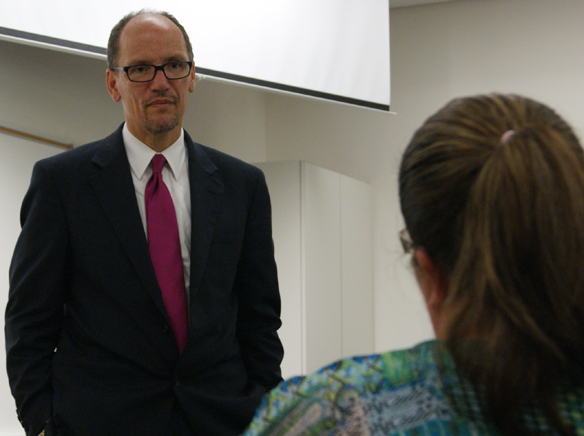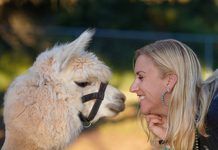U.S. Secretary of Labor Thomas E. Perez stood at the front of the room listening intently to the 30-person class as they told their story of whom they were and why they are here. They were all immigrants hailing from countries as close by as Mexico to Iraq. They all had one thing in common—they were medical professionals. Yet with their move to the U.S. they licenses were no longer valid and they had to return to school. As they finished their stories, Perez began to tell his.
U.S. Secretary of Labor Thomas E. Perez stood at the front of the room listening intently to the 30-person class as they told their story of whom they were and why they are here. They were all immigrants hailing from countries as close by as Mexico to Iraq. They all had one thing in common—they were medical professionals. Yet with their move to the U.S. they licenses were no longer valid and they had to return to school. As they finished their stories, Perez began to tell his.
“My father was a doctor as well,” he said. “He went to school in the Dominican Republic and because of the political situation there he had to leave. An experience some of you can relate to.”
Perez said listening to the individual stories he thought of his father coming to America looking for a better life.
“The best measure of how someone will succeed in the future is how much they succeeded in the past,” he said. “You have all succeeded in the past in your various fields and in your various countries and I’m confident you will all succeed in the future as a result.”
This is where the Welcome Back Center at Grossmont College comes into play. As part of the Health Workforce Initiative from the California Community College Chancellors Office, it aids internationally trained healthcare professionals earn the license they need in order to join the workforce.
“We work with internationally trained professionals, so that’s doctors, nurses, pharmacists and anybody who was trained in their country of origin as healthcare professionals,” said Ann Durham, director of the San Diego Welcome Back Center. “Not only do we help them get licensed but we also help them find a job.”
From 20 employees to a mere two the program still survives even after a large chunk of its funding dried up.
“We’ve had to downsize and I’m very proud we do so much with so little resources and we’re able to impact the lives of so many people in our community,” said Durham.
Since 2001, more than 3600 participated in the program from 104 countries. Right now there are approximately 700 active participants who are working with the program.
“Welcome back kind of means welcome back to the healthcare profession,” said Durham. “A lot of times people might be a doctor in their country of origin and they might be a taxi driver here or working at a convenience store as there is a lot of red tape in the way of getting back to their healthcare profession.”
Basil Whayeb a registered nurse from Baghdad, Iraq came to the United States in Aug. of last year. He was an interpreter aiding the U.S. army before the war ended there. He enrolled in the program soon after arriving here to get his license.
“I came here alone, I left my family over there to have that hope to be an RN again here in the states,” said Whayeb. “I came to support my family from over here and work in this industry.”
Bashar Matti, also from Baghdad, is married and has a daughter. He graduated in 2007 from the University of Baghdad as a RN in an intensive care unit of specialized open-heart surgery. Matti worked there for three years and then went on to work for the International Organization for Migration, an organization devoted to helping individuals who helped the military in Iraq migrate to the United States. Matti left Iraq for Jordan after the security situation took a turn for the worse. He waited two years before he was cleared to enter the United States.
“I came here on April 22, 2014,” he said. “I start thinking about how I get my license back and found the welcome back center.”
Taking full advantage of the opportunity he has Matti enrolled and is on track to receive his license.
“This is the most important part of my story,” he said. “If you have no experience and you have not gone through the U.S. hospital system all the charts and documentation is different and they don’t teach you that in school. Being in the welcome back center is helping me learn all this.”














